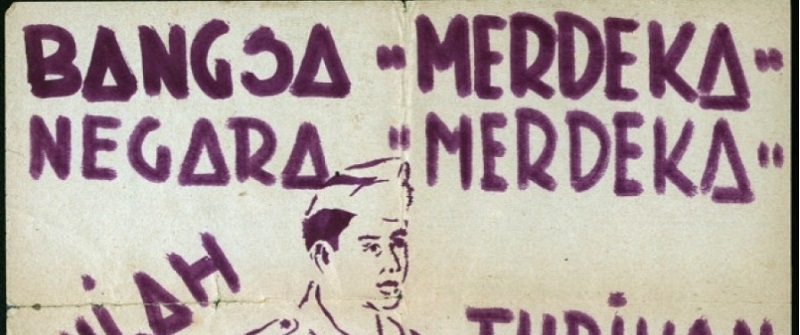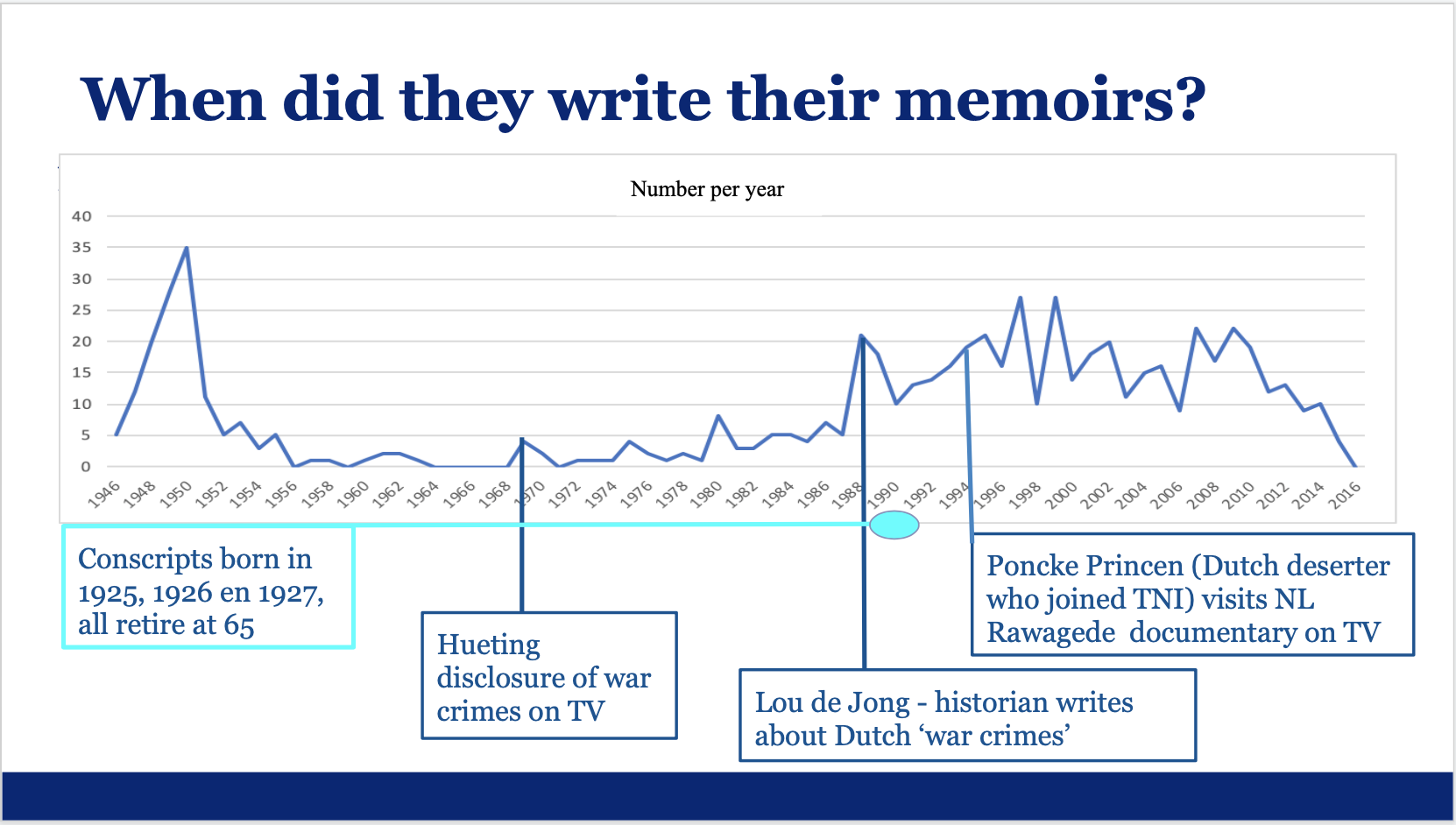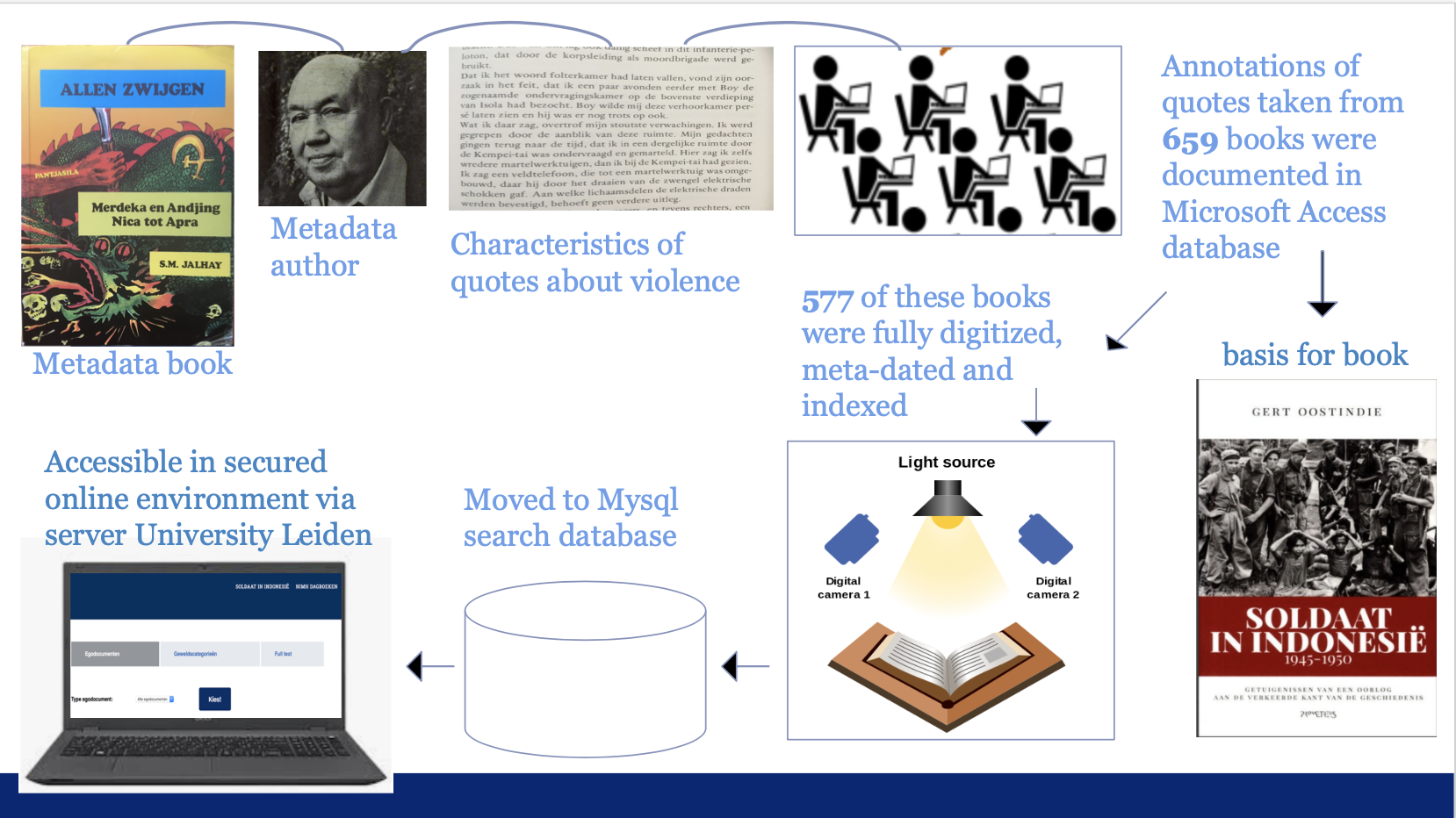
23 Aug Blog: How Google Translate can give a new generation of Indonesian historians access to stories from ‘the other side’
By Stef Scagliola.
Imagine what Indonesian historical research could look like if there were no language barriers, no travel costs and no visa issues, and instead just a strong Wi-Fi signal, dedicated Dutch-Indonesian translation software, and full and instantaneous access to the components of our shared history. A very first rudimentary step in this direction was taken during the online workshop on Dutch Military Memoirs, held within the context of the Independence, decolonisation, violence and war in Indonesia 1945-1950 research programme and involving 25 researchers and students from the Gadjah Mada University in Yogyakarta on the 1st of July.
Digital technology fully dominates our professional and private lives in an alarming way, and at the same time facilitates encounters that were inconceivable 20 years ago. Nobody back then would have believed that in 2021 it would be possible to instantaneously translate text taken from the diaries and memoirs of Dutch veterans deployed during the Indonesian independence struggle (1945-1949) into Bahasa Indonesia. But this option now makes it possible for young Indonesian historians to delve into the personal thoughts of their grandfathers’ former foes without having to learn to read Dutch first.
Inclusion of perspectives

Image left: Surinamese-Creolo headscarf to commemorate the 100th anniversary of the abolishment of slavery in Suriname on 1st July 1863. Keti koti = break the chains. Source: Wikipedia.
Image right: Poster ‘Free nation, independent state. This is our goal’. Source: KITLV/Leiden University Library.
The workshop took place on the 1st of July, the day on which the abolishment of Dutch slavery is commemorated. This is just a coincidence. And yet the notion of the need to not just pass over this date but instead explicitly mention its significance points to its ‘inclusion’ in the list of memorable dates. We add a different perspective to our historical memory. The link with the Indonesian participants given the opportunity to delve into Dutch veteran memoirs is that it could have the same effect: adding a Dutch perspective or – even better – deconstructing both ‘the’ Dutch and ‘the’ Indonesian perspective. Socialization processes at work when creating a national identity tend to invigorate the notion of a perspective shared by an entire nation. Personal documents have the potential for breaking down this shared belief or for creating a better understanding of the context in which it evolved. Indonesian researchers might gain some insight into the mindset of members of the Dutch military, into their motivation or aversion to fight, and first and foremost into how they reconciled a love for the country and its people with being there to obstruct its quest for freedom. But what about the reverse situation? How can Dutch historians gain easy access to Indonesian ego-documents relating to the 1945-1949 war?

Image left: Memoirs of the Indonesian army commander A.E. Kawilarang, Untuk Sang Merah Putih (Pustaka Sinar Harapan, Jakarta,1988).
Image right: Seribu Wajah Wanita Pejuang (ed), Irna Hadi Soewito (1995), memoirs of women involved in the Indonesian independence struggle.
Differences in historical documentation
Balance in the historical documentation of counterinsurgency wars is problematic. The asymmetry between the rebellious party lacking resources, having to hide, and only able to revert to small, unexpected attacks and sabotage, and the powerful enemy able to operate thanks to a state-funded material and human infrastructure, is also reflected in the situational setting needed for documentation. Dutch soldiers were able to write about their experiences because they had permission to do so. They had time, a table and chair, a pen and sheets of paper or a diary at their disposal. The postal service represented a lifeline to their homes in the Netherlands. Despite censorship, information of a sensitive nature did trickle through to relatives and friends. Their adversaries had to remain invisible, meaning that any trace of their presence as guerrilla combatants had to be erased. The transfer of messages was limited to matters relating to the struggle. These limitations obviously resulted in a scarcity of personal documents on the Indonesian side, compared to those on the Dutch side. In-depth research at a regional and local level might, however, yield some surprises. This is what this young group of Indonesian historians, guided by professors Bambang Purwanto and Abdul Wahid, are after. Aside from their specific research topic, they want to identify documentation on the circumstances under which Indonesian soldiers had to operate. They are not merely interested in orders sent from one commander to the other but are in search of reflections on the hardships endured, what motivated soldiers to risk their lives, their relationships with their peers, their commander, their families and local villagers. Dutch historians would, naturally, be drawn to how Indonesian soldiers perceived their Dutch enemies. Whether a reverse workshop can be held will depend on how successful this group of researchers is in finding the ‘gems’ among the mass of ‘grey literature’ that is semi-public and often only known about by a select few. Frequently, this comes down to booklets based on notes jotted down by a veteran for his next of kin, or limited editions of a book published by a journalist with an interest in local history.
Interest in narratives of the Dutch military
With regard to memoirs in hindsight, most Dutch veterans started writing their memoirs or publishing their diaries decades after the struggle, with a strong peak after their retirement in the mid-1990s.

Graph of the number of memoirs written in the period 1946 to 2016, with peaks around specific public debates caused by disclosures about acts of violence committed by Dutch military in Indonesia (1945-1949).
However, with the exception of a closed group of military historians, the scholarly interest in their stories only started to grow as a result of the aforementioned changing political tide. The interest of old and new generations of historians and activists was triggered by the ruling of a Dutch court in 2011, which stated that the Dutch government would have to pay compensation and offer apologies for a mass execution perpetrated by the Dutch military in West Java in 1948. One of the results of this new interest was the book entitled Soldaat in Indonesië – Getuigenissen van een oorlog aan de verkeerde kant van de geschiedenis (Soldier in Indonesia – Testimonies from a war on the wrong side of history) by Gert Oostindie. It is based on a corpus of around 700 published memoirs, annotated according to a fixed set of metadata and themes in a stand-alone digital database. This KITLV initiative was mirrored by a database created at the Institute of Dutch Military History, consisting of annotations on 110 contemporary diaries handwritten by members of the Dutch military. Driven by the need for access for the Dutch research programme, the two databases were published online in a secure space with an authentication procedure. For reasons of copyright and privacy, they cannot be opened up to the general public, but are exclusively accessible for research purposes. The logical next step was to give access to both databases to those Indonesian researchers who are part of the research programme.

Workflow of the process that led to the online version of the dataset with limited access. The digitization and creation of the search environment was possible thanks to the efforts of the Leiden University Library (Carola van der Drift) and the Centre for Digital Scholarship (Peter Verhaar).
Experiences during the workshop
This initial exploration of the database can be considered a success and created an appetite for more, despite the fact that most of the topics being studied by the 25 Indonesian researchers are not fully mirrored in the topical range of the Dutch personal documents. This lack of reference to particular topics is related to the fact that Dutch soldiers were only deployed in certain areas of Indonesia. But in addition to sources that complement a particular event or topic the researchers are studying, the database can offer insights into how meaning and sense are created by looking at how particular topics or concepts are recurrent and which terms are used. One of the participants was struck by the negative associations with the term ‘extremist’ that she found, whereas in the Indonesian discourse the term is associated with ‘pride’, ‘heroes’ and ‘self-sacrifice’. Another contrast observed are the opinions of Dutch soldiers on the political leader Sukarno.
One participant suggested including the captions and photos published in the memoirs in the database, because they are telling where the visual component of the representation of the struggle is concerned. On opening the PDFs included in the database, he could glance at photos taken by Dutch soldiers of landscapes, places and people he knows quite well, and was struck by the nature of the captions. Seen from an anthropological and linguistic cross-cultural perspective, the database is a potential goldmine, as words, thoughts, feelings and attempts to create meaningful narratives are richly represented in the contemporary accounts (diaries) and in the memoirs written in hindsight (memoirs).
As always, however, there are some hurdles to overcome and pitfalls to avoid. One hurdle that can easily be resolved is the difference in the spelling of place names. Young generations of Indonesians are used to the modern Indonesian spelling, while the veterans use the colonial spelling, sometimes even spelling the old names wrongly. By adding a searchable list with both spellings and making it interactive so that users can add variations of wrong spellings, looking up passages in which a particular region, town or village is mentioned can be done in a much faster way. This feature will be added to the database. Another hurdle is related to methodology. When dealing with a vast amount of searchable data, one has to develop a capacity for easily switching from looking up a reference to something that is already known to exploring how particular practices are described by endlessly trying out the results of a broad range of keywords. Although this does carry the risk of becoming lost, such an approach can yield insights into what members of the military say about the local population, in which context they encounter each other, and how they deal with the language gap.
In general, this ‘explorative approach’ is most useful at the very start of a research process, when topic and method have not yet been fully defined. But also when used in a later phase, taking a step back and exploring broader features of the corpus, it can help with finding alternative ways of interpreting sources. Several Indonesian researchers chose to study how particular ethnic groups, such as the Chinese or Arabs, operated during the revolution. They will probably not find details about the dynamics within these groups and their relationship with the Indonesian independence movement. What could, however, yield valuable insights is to check how the different ethnic groups were portrayed by the Dutch. Is there coherence or a diversity? How do they see the position of these groups within the overall objective of full independence for the Indonesians?
The researcher studying the violent attack by local Indonesians on the Malay elite in Sumatra in 1946 found two incidents of violence in Medan mentioned by the Dutch. In these accounts, empathy with the victims of the attack is displayed. While the researcher observed that this does not yield concrete data on his central theme, the words and context within which empathy is expressed could trigger the idea of keeping track of the circumstances in which empathy with victims of violence is articulated. What role does ‘empathy’ play in the case of the Malay sultan in Medan? Are there any second thoughts by the perpetrators of the violence? Or does the sense that justice has been done overrule any other sentiment? Is there any trace of ‘emotion’ in the sources that refer to the violence?
A trap that should be avoided is to completely trust the performance of Google’s translation software. Like all software, it handles nuance and synonyms poorly. The tool is meant to be used for exploring what would be worthwhile studying with more scrutiny. Before a reference to a source can be safely included in academic work, it should be checked by a knowledgeable human translator.
An appetite for more: potential next steps
Aside from adding a name list, there are still a lot of tasks to take up. After maximizing the potential output for Indonesian and Dutch scholars of this database comes the challenge of creating an Indonesian one. But what about our reliance on technology? If the environment is built with open-source software but we are still embracing Google Translate, can we state that the research output is neutral? Does it indeed have the potential to facilitate a more diverse range of historical narratives by bridging the language gap? Maybe a more intentional step in the right direction could be taken by the Dutch historical community, together with cultural heritage authorities. After concluding a research project that has generated resources for Dutch research institutions for four years – with, of course, an Indonesian counterpart – it would be time to go a step further and create a digital space for the Indonesian historical community with full access to the Dutch National Archives, supported by an improved version of the Dutch-Bahasa translation software. This could form the basis for future online collaborative Dutch-Indonesian research seminars, with in the long run the perspective of a more balanced community of scholars studying the history of the area.
With special thanks to my colleague Thijs Brocades Zaalberg and his sharp editorial eye and to Zena Vollenberg for her English proof-editing.
Stef Scagliola is a historian specialized in digital history and at present a fellow at the KITLV.




Bambang Soemarwoto
Posted at 07:52h, 13 SeptemberIn contrast to the Dutch society who has a rooted writing culture, orality is much more prevalent within the Indonesian society. The unfavourable consequence is that historical accounts fade away with the passing of generations. With all due respect to the current Dutch effort, a fundamental question is: will history telling become skewed in the future? See https://senstvt.blogspot.com , also for issues regarding research at higher education institution in Indonesia.
Saut Situmorang
Posted at 09:06h, 16 NovemberIn English it is wrong to use “Bahasa Indonesia” for our national language Indonesian. Do you even know what “bahasa” means in English?! Stop continuing with this mistake.
We don’t need to deconstruct Our colonial history. It is the Dutch who need to do it for they have been revising their colonial history of Indonesia for unethical and unhistorical purposes!
Saut Situmorang
Posted at 09:08h, 16 NovemberIn English it is wrong to use “Bahasa Indonesia” for our national language Indonesian. Do you even know what “bahasa” means in English?! Stop continuing with this mistake.
We don’t need to deconstruct Our colonial history. It is the Dutch who need to do it for they have been revising their colonial history of Indonesia for unethical and unhistorical purposes!
Marjolein van Pagee
Posted at 01:57h, 17 NovemberIt’s hard to believe that the author of this blog (who seems to care so much about translations) didn’t know about it, but for those who read this: apart from Google Translates there is something like Histori Bersama! An online platform that is building a database of translations since 2016. And to be clear: when I founded this organization my purpose was not to impose Dutch colonial ideas on Indonesians, on the contrary, my hope was that the translations might serve as a mirror for Dutch people, to broaden our narrowminded horizon. It is us, not the Indonesians, who have a lot of work to do! Stop teaching Indonesians, they have to teach us! We have to change our falsified history books, our way of thinking! We have to dismantle the empire that we once built! Also in our mind!
Perhaps the reason that the author didn’t mention our efforts is that Histori Bersama happens to criticize the government sponsored research in which KITLV is taking part too.
Another thing I noticed is that all of you talk as if this was a war between two equal parties. This is wrong and misleading. It was a re-occupation of land that did not belong to the Dutch. It was illegal in 1945 and in 1600. I think we should rewrite our books based on the realization that there was no legal basis for the occupation that we used to call “Indië”.